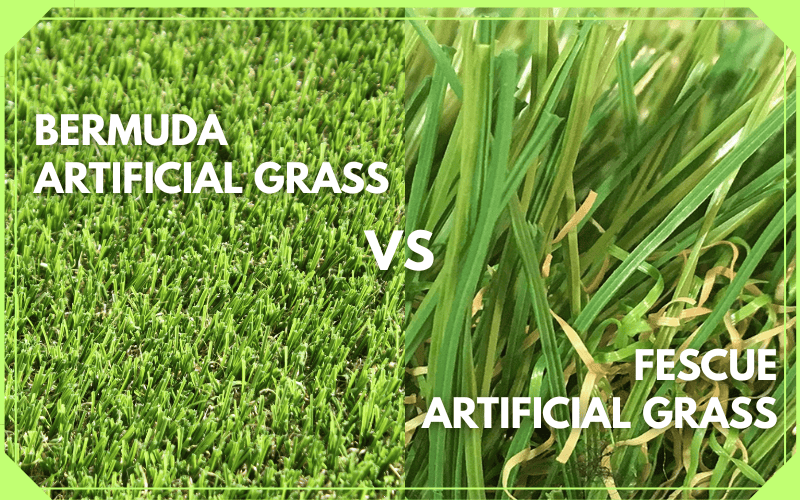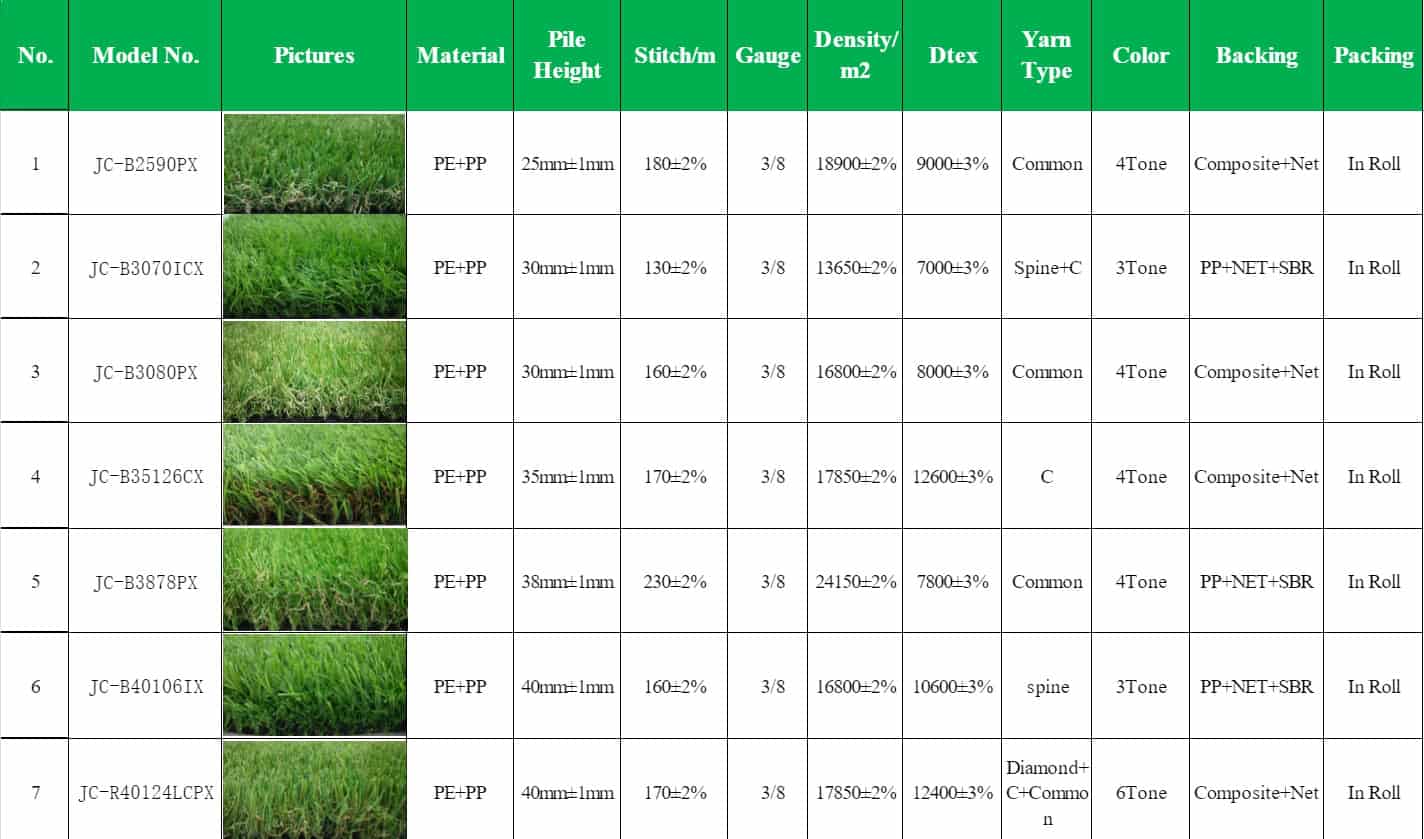“Bermuda looks sharper, but is it too hard?”
“Fescue seems more natural, but will it flatten fast?”
If these are the kinds of questions running through your head, you’re in the right place.
In this guide, we’ll compare Bermuda and Fescue artificial grass across key areas like durability, climate resistance, comfort, appearance, maintenance, and installation needs. You’ll also get practical advice for choosing based on your specific needs—whether you’re a pet owner, have kids, or just want better curb appeal. We’ll break down cost differences, assess which one looks more realistic, and explain why many homeowners skip real grass altogether. Finally, we’ll wrap up with a clear recommendation to help you decide with confidence.
Bermuda vs Fescue Artificial Grass: A Quick Overview
Bermuda and Fescue artificial grass are two of the most popular turf styles you’ll find. They’re designed to mimic real Bermuda and Fescue grass, but in a low-maintenance, synthetic form.
Bermuda-style turf looks short, neat, and vibrant—ideal for high-traffic spaces or athletic use. Fescue-style turf has longer, softer blades with a darker green tone, offering a more natural, lush appearance for home lawns.
Choosing between them comes down to how you want your lawn to feel, look, and perform. Let’s break down the real differences in the next section.
Key Differences Between Bermuda and Fescue Artificial Grass
When comparing Bermuda vs Fescue artificial grass, it’s not just about looks. These two turf styles differ in how they perform, feel, and handle different conditions. From durability to climate resistance and even installation needs, each one has its own advantages. Below, we break down the key differences you should know before choosing the right option for your lawn.
Durability and Traffic Tolerance
If your lawn will get a lot of use—kids running, dogs playing, frequent walking—Bermuda-style turf is usually the better pick. Its blades are shorter and more rigid, making it resistant to flattening or wear. Fescue, while softer, is less durable under pressure and better suited for decorative or low-traffic areas.
Bermuda turf often uses stronger fiber structures like C-shaped or W-shaped blades, which bounce back faster. This makes it popular for sports areas and front yards with heavy use.
UV Resistance and Climate Performance
Artificial grass lives outdoors, so how it reacts to sun and weather matters a lot. Bermuda-style turf handles direct sunlight and high heat well. It resists fading and won’t get brittle as easily under intense UV exposure.
Fescue-style turf is more versatile in mixed climates. It stays cooler in partial shade and works well in regions that don’t get extreme heat. If you live in a hot, sunny area, Bermuda is usually the safer bet.
Texture and Foot Feel
The difference is easy to feel. Fescue turf is softer and more cushioned. It mimics the feel of thick, natural lawn and is great for barefoot play or lounging.
Bermuda feels firmer underfoot. Some people like its athletic, springy response—especially in high-use areas. But for comfort-focused spaces, Fescue wins in softness.
Color and Appearance
Bermuda turf tends to be bright green and uniform, with a shorter pile and tighter stitch. It looks neat, sharp, and modern.
Fescue offers a more natural, varied appearance. Its olive tones and longer blades help it blend into gardens and shaded landscapes. If you’re aiming for a “lush and real” look, Fescue often gets closer to the real thing.
Maintenance Differences
Neither option needs watering or mowing, but their upkeep is slightly different. Fescue’s longer blades can mat down over time and may need occasional brushing to keep them upright.
Bermuda, being denser and shorter, tends to hold its form better. If you want the lowest possible maintenance, Bermuda has a slight edge.
Installation & Infill Requirements
Both types require a solid base and proper drainage. But Bermuda turf, due to its stiffer blade structure, may perform better with added infill like silica sand or rubber granules for bounce and resilience.
Fescue can sometimes be installed with lighter infill or used as decorative turf. However, for heavy use, you’ll still want proper infill and sub-base support.
| Feature | Bermuda Artificial Grass | Fescue Artificial Grass |
| Durability | High resilience for heavy traffic | Softer and less resistant under frequent use |
| Climate Performance | Performs best in hot, sunny conditions | Works well in mild or partially shaded climates |
| Foot Feel | Firm and springy underfoot | Soft and cushioned; ideal for barefoot comfort |
| Color & Appearance | Bright green, tidy, uniform look | Darker olive green, natural and lush appearance |
| Maintenance Needs | Low maintenance, holds shape well | May need brushing to keep blades upright |
| Installation & Infill | Benefits from firm infill like silica or rubber | Lighter infill may work for decorative use |
How to Choose Between Bermuda and Fescue Artificial Grass
Bermuda vs Fescue artificial grass—how do you choose? The answer depends on how you’ll actually use your lawn. Whether you’re a pet owner, a parent, or simply looking for great curb appeal, each turf has strengths that match specific needs. Here’s how to make the right pick based on your lifestyle and priorities.
For Pet Owners
If you have pets, especially dogs, Bermuda turf is more practical. Its shorter, firmer blades handle wear and tear better, and they’re easier to rinse off. Many dog owners find Bermuda dries faster after cleanup and resists odor build-up.
For active pet households, Bermuda is your better bet.
For Families with Kids
Fescue turf offers a softer, more cushioned feel, which is ideal for play zones. It’s gentle on skin and more forgiving if kids fall or crawl. That’s why many families choose Fescue for backyards or shared garden spaces.
For child-friendly lawns, Fescue is the smarter choice.
For Hot Climates vs Mild Climates
Live in a hot, sunny area? Bermuda turf holds up better under heat and UV. It won’t fade or flatten easily in full sun. In cooler or partly shaded areas, Fescue blends more naturally and stays comfortable.
Hot climate? Go Bermuda. Cooler or mixed weather? Choose Fescue.
For High-Use vs Decorative Lawns
If your lawn is more for function—gatherings, sports, walkways—Bermuda wins for durability. But if it’s for looks only, Fescue’s natural, lush appearance adds more visual value.
For hard-use surfaces, choose Bermuda. For ornamental lawns, go with Fescue.
For Budget-First Buyers
Trying to get the most out of your investment? Bermuda generally lasts longer under wear, offering better long-term value if you expect heavy use. Fescue works well for low-traffic areas where longevity isn’t a major concern.
For cost-efficiency in active spaces, Bermuda makes more sense.
For Lawn Appearance Priority
If you just want your lawn to look lush and real, Fescue takes the lead. Its longer blades and darker tones make it resemble a natural lawn more closely—especially in landscaped or shaded areas.
For maximum realism, Fescue stands out.
Cost Comparison: Bermuda vs Fescue Artificial Grass
Let’s talk numbers. While prices vary by supplier and region, there are some clear trends when it comes to Bermuda vs Fescue artificial grass cost.
Upfront, Bermuda-style turf generally costs more—typically around $2.80 to $4.50 per square foot for materials. Its blades are denser and stiffer, requiring more fiber and stronger infill to maintain performance over time. Fescue turf is often more affordable, averaging $2.30 to $3.80 per square foot, and in low-use areas, it may even be installed with minimal infill, reducing costs further.
Installation labor usually adds another $4 to $6 per square foot, depending on your region and site preparation needs. So for a 1,000-square-foot lawn, Bermuda may total $8,800 or more, while Fescue could come in closer to $7,000–$9,000.
In terms of maintenance, both options are low-effort, but there are slight differences. Fescue’s longer blades may require more frequent brushing to keep them upright, while Bermuda tends to hold its shape better with less touch-up.
Long-term value depends on how you use the turf. For active lawns with pets, kids, or heavy foot traffic, Bermuda’s durability can make it the better investment despite a higher initial price. If you’re covering a low-traffic area or prioritizing appearance over toughness, Fescue offers good value without stretching the budget.
| Cost Factor | Bermuda Artificial Grass | Fescue Artificial Grass |
| Material Price | $2.80 – $4.50 per sq ft | $2.30 – $3.80 per sq ft |
| Installation Cost | $4 – $6 per sq ft | $4 – $6 per sq ft |
| Typical Total (1,000 sq ft) | $8,800 – $10,500 | $7,000 – $9,000 |
| Maintenance Needs | Minimal upkeep; blades hold shape well | May need more brushing due to longer pile |
| Long-Term Value | Higher cost, better for active/high-traffic use | Lower upfront cost, ideal for low-use areas |
Which Type Looks More Realistic? Bermuda or Fescue
If you’re aiming for a lawn that truly looks like real grass, Fescue-style artificial turf usually gets the edge.
Fescue blades tend to be longer, softer, and more irregular—closer to how natural grass grows in a backyard or shaded area. The color is typically a deeper olive or multi-toned green, with subtle variation that adds realism. When you stand back or take a photo, it’s often hard to tell it’s fake.
Bermuda turf, by contrast, has a cleaner, more uniform appearance. Its bright green color and shorter pile make it look freshly mowed or almost manicured, which some homeowners prefer. But this neatness can sometimes look less natural, especially in settings where people expect a “wild” or lived-in lawn.
So if your goal is authenticity over perfection, Fescue is usually the better pick for visual realism.
Why Not Use Real Bermuda or Fescue Grass?
Real Bermuda and Fescue grass may seem like the most natural choice—but they come with a lot of upkeep. To keep them green and healthy, you’ll need frequent watering, mowing, fertilizing, and weed control. In dry or hot climates, water usage alone can be costly or restricted.
Even with regular care, natural grass can develop patchy areas, bare spots, or discoloration, especially in high-traffic zones. It also goes dormant in colder seasons, losing its green color for months.
Artificial turf modeled after Bermuda or Fescue offers the same visual appeal without the hassle. You get a lush, green look year-round—with no watering, no mowing, and almost no maintenance.
Final Recommendation: Which One Should You Buy?
If you’re still torn between Bermuda and Fescue artificial grass, here’s the quick answer: choose based on how you’ll use your lawn, and what look you prefer.
Go with Bermuda-style turf if you want a clean, bright lawn that stays neat under heavy use. It’s ideal for pets, play, and high-traffic areas—and it’s built to last.
Choose Fescue-style turf if you’re aiming for a more natural, lush appearance with a soft feel underfoot. It’s great for quiet yards, shaded spaces, and decorative landscaping.
Both options offer low maintenance and long-term savings. If you’re still unsure, request samples, compare them in your space, and talk to a turf expert to find the best fit for your lifestyle and climate.
Still Deciding? Let’s Make It Easy.
Whether you’re leaning toward the vibrant neatness of Bermuda-style turf or the soft, natural texture of Fescue-style grass, the real difference starts beneath the surface. At Jcturf, we offer both styles—engineered with S-type, C-type, or M-type blades and crafted using certified PE and PP fibers—to meet the specific demands of performance, realism, and longevity.
Our turf systems are tested using FIFA-standard abrasion and UV resistance equipment, ensuring each roll lasts up to 8+ years of outdoor use with minimal maintenance. You can even customize density, yarn count, or color tone to match your site and budget.
Need help choosing? Our technical team will guide you based on use-case, climate, and visual goals—and we’re happy to send free samples so you can see and feel the difference for yourself.
Request a custom quote or sample now—and make the confident choice between Bermuda and Fescue turf with support that’s as reliable as our grass.


